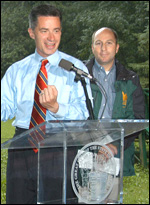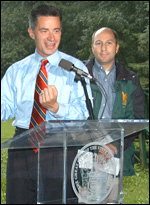
Gov. James McGreevey (left)
and DEP chief Bradley
Campbell.
In the run-up to the 2004 election, those who have high hopes that a change in administration will automatically mean the curbing of environmental abuses by government should look to recent events in New Jersey for a cautionary tale. In the Garden State, Democratic Gov. James McGreevey, who has historically been a friend to the environment, has perplexed and outraged environmentalists by taking several pages from the Bush administration playbook.
McGreevey last month signed sweeping legislation giving developers fast-track access to 1.5 million acres of the state. The act radically streamlines the permitting process for new construction in urban and suburban areas, and even rural areas designated as town centers. Critics fear that such rapidly permitted development will come at the expense of the environment and public oversight.
The New Jersey fast-track legislation contains extraordinary provisions. It forces the state departments of environmental protection, transportation, and community affairs to either approve or disapprove a developer’s permit application in just 45 days — after which time, unresolved requests get automatic approval. The act also privatizes the permitting process, letting developers hire private consultants to write and review permits, and largely extinguishing agency oversight. In another proviso, approved fast-track permits, when contested in court, become final with a single judge’s ruling. No public or agency appeal is allowed.
Environmentalists say the fast-track law imperils the last remaining open space in New Jersey’s designated “smart growth” zones, encompassing 20 percent of the state. It puts endangered species like the black-crowned night heron, peregrine falcon, and bald eagle at risk, denying them vital urban nesting grounds along the Atlantic Flyway. And, the advocates say, it could adversely affect about 85 percent of the state’s people, allowing fast-tracking not just of housing and commercial developments, but even new highway and port projects.
Playing Fast and Loose
McGreevey’s process with fast-track emulated Bush administration tactics in a number of troubling ways. First, the bill was written behind closed doors, with the exclusive help of business, and without the involvement of the environmental community — much like Vice President Dick Cheney’s energy plan. The act was secretly drafted last spring by Michael DeCotiis, McGreevey’s top lawyer, with input from the New Jersey Development Council. This quasi-governmental advisory board, established by the governor, includes 28 powerful builders who have contributed $3.25 million to McGreevey and other Democrats.
Once written, fast-track was rammed through the legislature with unprecedented speed: The bill first became available for public comment on a Friday in June, was voted out of committee the next Monday, was passed by the Democrat-dominated legislature that Thursday, and was signed in seclusion by the governor — moves calculated to keep the unpopular law out of the media eye. These are tactics familiar to the Bush White House, which has regularly announced environmental bad news on Friday afternoons.
Attorney Tom Borden of the Rutgers Environmental Law Clinic compares fast-track’s rushed passage to that of the U.S. Patriot Act, noting that no state legislators “had likely read this bill before they approved it, to see the fundamental flaws.”

This peregrine falcon prefers
life in the slow lane.
Photo: U.S. FWS.
Even McGreevey’s appointed Department of Environmental Protection commissioner, Bradley Campbell, recognizes the harm done to the governor’s eco-friendly reputation. “Because the legislation was rushed through, and the legislative process was a terrible one, it has been natural for environmental groups to assume the worst,” he says. But, he adds, “As everyone sees how we implement this law, [environmentalists] will breathe a collective sigh of relief, because they will find that the governor’s commitment to lead the nation in tough environmental land-use standards is intact and strong.”
Environmentalists aren’t buying it, and have come out en masse against the law. “There’s a broad and deep fury at this,” George Hawkins, chair of the New Jersey Council of Watershed Associations, told the New Jersey Star Ledger. “It’s a backroom deal.”
Just days before fast-track materialized, the public had celebrated the legislative passage of McGreevey’s Highlands Protection Act, restricting development on 395,000 rural acres in northwest New Jersey. In retrospect, conservationists see fast-track as payback to the New Jersey Development Council and other big developers, many of whom are McGreevey campaign contributors, and who were upset by the governor’s land-protection initiatives in the Highlands and elsewhere.
Caught in the Act
Borden calls the act unconstitutional, a violation of the separation of powers and due process. “The legislature is required to protect public health and safety,” he says. “But what this act does is to establish a system that delegates that responsibility away to private consultants, allowing them to authorize their own permits. It establishes unreasonable application deadlines, automatic approvals, and a lack of judicial review that leave state agencies’ hands tied. It is an abdication of governmental obligation to protect the people and the environment.”
Borden says that fast-track mirrors Bush tactics intended to gut the National Environmental Policy Act. By streamlining NEPA, which calls for tough environmental assessments of proposed airports, roads, and other federal projects, Bush claims — as does McGreevey — to be cutting regulatory “red tape” and speeding economic growth. Instead, environmentalists say, fast-tracking rolls back environmental safeguards and public oversight.
Campbell calls the NEPA/fast-track analogy “a ridiculous assertion.” Fast-track “is different because it is narrowed to those areas of the state where both planning and environmental data suggest that development is appropriate,” he says. “It is exactly the opposite of Bush administration proposals that streamline logging and other [harmful activities] in areas known to be environmentally sensitive.”
Environmentalists call this hairsplitting. “The act is potentially disastrous” for the urban and suburban environment, Borden says. “How disastrous depends on implementation.” The act’s language is so broad, say critics, that unless its scope is constrained by as-yet-unwritten regulations, it could set back state conservation efforts by decades.
Campbell defends fast-track, claiming that it improves upon “one-size-fits-all” laws that are equally strict for pristine wildlands and urban areas. “The old approach undermines environmental protection by making it cheaper and easier to build in the [pristine] areas that we most want to protect, and setting artificial barriers to development — adding cost and delay — in cities and aging suburbs and other areas appropriate to development.”
Environmentalists counter that urban green places are invaluable precisely because they are so rare, and thus deserve the same strict protection as pristine lands. Borden also contends that fast-track violates McGreevey’s own executive order on environmental justice by setting a weaker protection standard for low-income, African-American, and Hispanic urban communities than for wealthier, mostly white areas. The law could unfairly target development for the communities already most burdened by pollution, adding new environmental problems while restricting public comment.
In a worst-case scenario, says Borden, a fast-track project could harm “groundwater, surface water, wetlands, public health, and lead to public exposure to [industrially] contaminated soils.” As written, the law is so broad that it could even speed building atop the state’s 15,000 toxic waste sites, according to a New Jersey Star Ledger editorial. Such sites, the paper adds, are enmeshed in complex issues and prone to harsh disagreements that could never be fairly resolved in 45 days.
Tie Me Up! Tie Me Down!
McGreevey’s fast-track legislation resembles the president’s environmental policies in yet another way. Like so many Bush initiatives, on everything from snowmobiles in Yellowstone to logging in national forests, fast-track will likely be tied up in lawsuits for years.
Still, no one in New Jersey is asserting that Bush and McGreevey are cut from the same cloth. They aren’t. But what remains troubling is the abrupt about-face of an environmentally friendly administration, and the speed with which it embraced Bush-like stratagems to pass pro-business, anti-democratic legislation.
In just three and a half years, the White House has legitimized a barrage of dirty tricks — unprecedented secrecy, arcane legal loopholes, executive edicts, and privatization of the regulatory process — that any clever official can now use to reward major campaign contributors and overthrow established environmental law. It remains for advocates to be vigilant with politicians of all parties until the genie of political corruption can be put back in the bottle.


